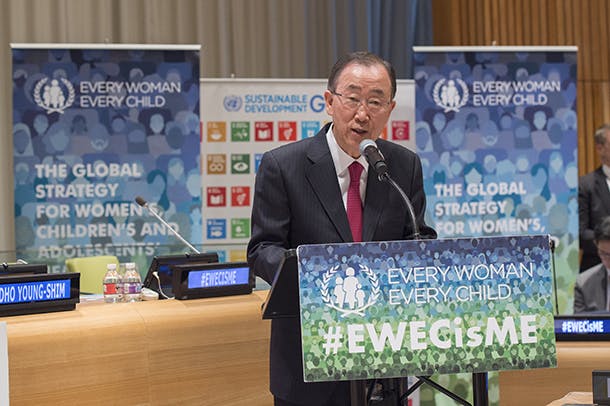
The opening of the 71st session of the United Nations General Assembly, an annual gathering of world leaders to discuss key global issues, will mark two milestones in our collective work to ensure better lives for everyone, everywhere.
First, this General Assembly is the first since world leaders gaveled in the Sustainable Development Goals one year ago. It also marks the one-year anniversary of the updated Global Strategy for Women’s, Children’s, and Adolescents’ Health, a shared global vision for how we can accelerate progress to better meet the needs of women, children, and adolescents to not only survive, but thrive and transform their communities in the coming 15 years.
At the heart of it, both the Global Strategy and the Sustainable Development Goals are about leaving no one behind – particularly girls and women. In support of that intention, and the broader Every Women Every Child movement, the United Nations Foundation committed $90 million in catalytic funds with partners over three years to pursue these key approaches.
Equity in access to services – even in areas of fragility
The era of the Millennium Development Goals yielded huge gains in reducing maternal and child mortality, in large part due to increased access to vaccines and malaria prevention tools, like bed nets, as well as reducing the unmet need for family planning and skilled attendance at birth. But collectively, we’re not yet doing enough to ensure those services in fragile or conflict-affected places. Thus, in the past year, we have worked with UN and other partners to intentionally address this gap as part of our commitment to Every Woman Every Child.
– Through funds raised from our Nothing But Nets campaign through our Million Nets Pledge to cover refugees and internally displaced people, we have provided funding for 1 million bed nets, which will reach 2 million people in fragile environments like the Central African Republic and South Sudan by the end of 2016.
– Through the Measles & Rubella Initiative, of which we are a founding partner, we granted $10 million to support eight countries experiencing measles outbreaks in Africa, Asia, and the Middle East, which resulted in over 8.7 million children being vaccinated against measles, one of the most contagious diseases.
Further, to better serve women, children, and adolescents in humanitarian and emergency settings, and in response to requests from our UN partners, we agreed to help mobilize action and raise attention to this critical issue. We will continue to work with remarkable champions, such as HRH Princess Sarah Zeid of Jordan and Kate Gilmore, Deputy High Commissioner for Human Rights, to advance the needs and rights of Every Woman Every Child Everywhere.
Innovating with a “big picture” AND “big tent” approach
We also know that we are unlikely to achieve the goals of the Global Strategy and the Sustainable Development Goals with existing tools and resources alone. Innovation and multi-stakeholder strategies are vitally important, in program design and fully leveraging the capacities and skills of the private sector.
– As part of our commitment to Every Woman Every Child we have worked in the past year to accelerate the provision of essential health information via SMS messaging.
– Programs in Guatemala and India supported by the UN Foundation’s Girl Up campaign, for example, offer a comprehensive and integrated package of solutions and services for adolescent girls while supporting local capacity building.
– Business Action for Family Planning, a partnership between the UN Foundation, UNFPA, Merck for Mothers, and Accenture Development Partnerships, engages the private sector in family planning.
Advocating and amplifying
As implementation of the Sustainable Development Goals begins in earnest, the advocacy momentum around women and girls’ health has remained high. We advocate on a range of critical policy issues such as global family planning programs, reproductive health, and developing better gender data to increase our knowledge base on girls and women. We also amplify our advocacy through multiple mediums and voices, from first-hand accounts of UNFPA’s work to enlisting champions for girls and women like Jennifer Lopez.
– Through the Universal Access Project (UAP) and partners, we successfully continued to strengthen U.S. government leadership on international reproductive health and family planning, including advocacy to ensure the U.S. contributes just over $600 million for international family planning, including $32.5 million for UNFPA
– Data2X, along with Open Data Watch, wrote Ready to Measure: Sixteen Indicators for Monitoring SDG Gender Targets, a paper which identified the gender indicators for the Sustainable Development Goals where monitoring can commence immediately, including at least seven related to health.
2015 provided us with the vision to leave no one behind; 2016 compelled us to sow the seeds to meet this promise. We have 14short years to go and millions of women, children, and adolescents that deserve our full focus and enduring allegiance to a better world for all. The UN Foundation remains committed, as ever, to ensuring women, children, and adolescents everywhere can survive, thrive, and transform our world by 2030.
[Photo: UN Photo]



 View All Blog Posts
View All Blog Posts